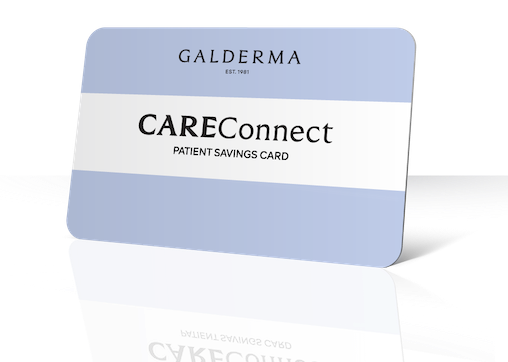Important Safety Information
Indication: ORACEA® (doxycycline) 40 mg* capsules are indicated for the treatment of only inflammatory lesions (papules and pustules) of rosacea in adult patients. ORACEA does not lessen the facial redness caused by rosacea. Adverse Events: In controlled clinical studies, the most commonly reported adverse events (>2%) in subjects treated with ORACEA were nasopharyngitis, diarrhea, hypertension and sinusitis. Warnings/Precautions: ORACEA should not be used to treat or prevent infections. ORACEA should not be taken by patients who have a known hypersensitivity to doxycycline or other tetracyclines. ORACEA should not be taken during pregnancy, by nursing mothers, or during tooth development (up to the age of 8 years) and may cause reversible inhibition of bone growth. If Clostridium difficile associated diarrhea (CDAD) occurs, may need to discontinue ORACEA. Although photosensitivity was not observed in clinical trials, ORACEA patients should minimize or avoid exposure to natural or artificial sunlight. The efficacy of ORACEA treatment beyond 16 weeks and safety beyond 9 months have not been established.
You are encouraged to report negative side effects of prescription drugs to the FDA. Visit www.fda.gov/medwatch or call 1-800-FDA-1088.
*30 mg immediate release and 10 mg delayed release beads
†As found in a 9-month clinical study
‡A multicenter, outpatient, double-blind, placebo-controlled, parallel group trial was conducted over 16 weeks to evaluate the safety and efficacy of ORACEA Capsules. A total of 251 rosacea subjects (≥18 years of age with 10 to 40 papules and pustules and 2 nodules, plus an IGA score of 2 to 4) participated
REFERENCES
1. National Rosacea Society 2020. Rosacea Review. Rosacea now estimated to affect at least 16 million American. Available at: https://www.rosacea.org/rosacea-review/2010/winter/rosacea-now-estimated-to-affect-at-least-16-million-americans. Last accessed: September 2021 2. Rosacea: Beyond the visible report. Available at: https://hosted.bmj.com/rosaceabeyondthevisible. Last accessed: September 2021 3. Del Rosso JQ, et al. Two randomized phase Ill clinical trials evaluating anti-inflammatory dose doxycycline (40-mg doxycycline, USP capsules) administered once daily for treatment of rosacea. J Am Acad Dermatol. 2007;56(5):791–802. 4. Huynh T. Burden of Disease: The Psychosocial Impact of Rosacea on a Patient’s Quality of Life. Am Health Drug Benefits 2013;6:348-354. 5. Schaller M, et al. Recommendations for rosacea diagnosis, classification and management: Update from the global ROSacea COnsensus (ROSCO) 2019 panel. British Journal of Dermatology. 2019. doi: 10.1111/bjd.18420. [Epub ahead of print]. 6. ORACEA [package insert]. Fort Worth, TX: Galderma Laboratories, L.P.; 2014. 7. National Rosacea Society. (2020). All About Rosacea. Available: https://www.rosacea.org/patients/all-about-rosacea. Last accessed: September 2021 8. Preshaw PM, et al. Modified-release sub-antimicrobial dose doxycycline enhances scaling and root planning in subjects with periodontal disease. J Periodontol. 2008;79(3):440–452. 9. Del Rosso JQ, et al. Comparison of anti-inflammatory dose doxycycline versus doxycycline 100 mg in the treatment of rosacea. J Drugs Dermatol. 2008;7(8):573–576. 10. Bhatia N. ORACEA 40 mg capsules for papulopustular rosacea. The Dermatologist. 2013;6(21s):1-4. Available at: https://www.hmpgloballearningnetwork.com/site/thederm/site/cathlab/event/oracea-40-mg-capsules-papulopustular-rosacea-1. Last accessed: September 2021 11. Theobald K, et al. Anti-inflammatory dose doxycycline (40 mg controlled-release) confers maximum anti-inflammatory efficacy in rosacea. Skinmed. 2007;6(5):221–226. 12. Fowler JF. Anti-inflammatory dose doxycycline for the treatment of rosacea. Expert Rev Dermatol. 2007;2(5):523–531. 13. Baldwin HE. Diagnosis and treatment of rosacea: state of the art. J Drugs Dermatol. 2012;11(6):725–730






